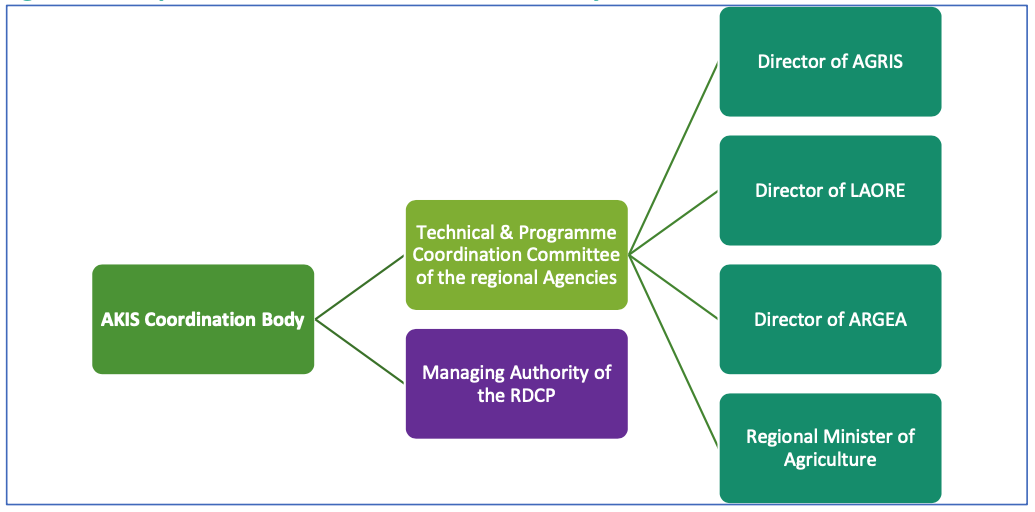2023
AKIS coordination bodies
governance

The Sardinian AKIS presents a structural complexity and high fragmentation due to the high number of actors involved. Sometimes the diverse components act as separate entities, not enough connected. Moreover, the prevalence of the sheep sector, often characterized by problems of ageing of farmers, small medium size and lack of innovations, influenced the structure of the actual AKIS and the propensity for innovation. However, there is a huge effort to overcome the risk of gaps and overlaps in research programs and projects, high administrative costs and duplication of interventions.
The political relevance given to AKIS strategies in the context of the CAP Strategic Plans (SPs)2023- 2023 has certainly highlighted the opportunity of defining governance bodies aimed at coordinating the AKIS-relating interventions and actors in view of their better implementation and contribution to the cross-cutting and specific objectives of the CAP SPs.
Particularly, the AKIS coordination body is indicated by the CAP SP 2023-2027 as a point of contact of the European Commission and of the European CAP Network. The lack of a clear and common definition of role and functions of the institute of the AKIS coordination bodies by the EU regulation has certainly favored the managing authorities of the CAP SPs in identifying the configurations that best fit the needs for governance of the AKISs and the expectations of the respective actors.
In Italy, as a consequence of the new delivery model, and differently from the previous programming periods, the former CAP SP 2023-2027 is established only at national level. However, given that the Regions/Autonomous Provinces have, by Constitution, the competence on agricultural matters, they have established Rural Development Complementary programmes (RDCPs), which, within the framework of the CAP SP, have their own governance and implement at the territorial level the rural interventions that are relevant to their specific territories.
This programming scenario implies that in Italy there are foreseen one AKIS strategy and an AKIS coordination body at CAP SP level (ch. 8 of the CAP SP; general directorate of rural development at the Ministry of Agriculture, food sovereignty and forestry) plus 19 AKIS strategies and respective AKIS coordination bodies at the level of the Regions and the Autonomous Provinces.
The general model of the AKIS coordination bodies for Italy is already indicated by the CAP SP and it mentions a composition by “the institutions that have responsibility/capacities to provide training, advisory services, research, information”. Sardinia Region can count on the presence of several public Agencies that have a widespread presence in the territories through various departments and offices. which together provide a variety of innovation support services in agriculture.
Through the institution of the AKIS coordination body, the Region of Sardinia aims at strengthening the coordination between Regional Agencies, Universities, Research Centres, Training bodies, Advisory services providers and other regional actors involved in agriculture and rural areas, with the ultimate purpose of: i) improving the relations within the system and knowledge flows between farms, agri-food and forestry enterprise; ii) promoting knowledge exchanges at national and international level within the framework of the European Partnership for Innovation in Agriculture (EIP).
Already in 2006, Sardinia region reorganized some roles and functions of bodies providing research, technical assistance and extension services within the AKIS, by establishing, based on a Regional Law, three regional Agencies, namely AGRIS, LAORE and ARGEA (see boxes). The coordination of the activities of the three of them was set based on the establishment of the Technical and Programmatic Coordination Committee that is composed by the general directors of the three Agencies and the Regional Minister for Agriculture.
Since then, the roles and functions of the three agencies has been clearly defined and applied, for example, for the purpose of the implementation of the rural development programmes. The three agencies have territorial offices across the region, through which, over the years, they consolidated a certain capacity to engage with local AKIS actors.
The Sardinian AKIS coordination body is set upon the former Technical and Programming Coordination Committee of the Regional Agencies (TPCC) and includes the Managing Authority of the Sardinian RDCP 2023-2027 (figure 1).
Figure 1: Composition of the AKIS Coordination Body of Sardinian RDCP 2023-2027

This implies that the AKIS coordination body is a collective one that includes sharing responsibilities and applying different institutional (i.e. Minister and managing authority) and non-institutional (Agencies) roles and functions relating to the AKIS strategy: design, programming and management, implementation, monitoring, paying and control of the interventions.
The functions of the AKIS coordination body include the following tasks:
AGRIS
AGRIS is the regional agency for scientific research, experimental and technological innovation in the agricultural, agro-industrial and forestry sectors. AGRIS has incorporated some important research departments as the Interprovincial Fruit Growing Consortium, the Provincial Fruit Growing Consortium, the Sardinian zootechnical and dairy Institute, the Cork Experiment Station, the Regional experimental center in agriculture and the Institute of Equestrian boosting. Its main goal is to promote the dissemination of its research and experimental activities among farms. For this objective, it collaborates with universities (e.g. University of Sassari and University of Cagliari), the institutes of the National Research Council (CNR), the Council for Agricultural Research and Economics (CREA) and other public and private actors both at national and international level. AGRIS is involved in several national and European projects (as LIFE and H2020 projects) and it has an important collaboration with Sardinian Agricultural High Schools, for example, for the provision of training to students and other types of exchanges with the educational system.AGRIS has 9 experimental and research centres across the regional territory.
More information is available at: https://www.sardegnaagricoltura.it/innovazionericerca/agris/
LAORE
LAORE provides technical assistance and advisory support to the farms and to processing firms aimed at quanti- qualitative optimization of production processes and the introduction of technological and product innovations. It represents the public advisory services provider in Sardinia. The main aim of the agency is to promote the development of the territories, multifunctionality, agrobiodiversity and Sardinian food products. It is a key actor in the Sardinian AKIS because of its role in providing technical assistance to farmers. Thanks to its 32 territorial offices, it covers the entire regional territory in a capillary way.
More information about the role and functions of LAORE are available at: https://www.sardegnaagricoltura.it/assistenzatecnica/laore/
ARGEA
ARGEA is the regional Pay Agency since October 2020 for the European Agricultural Fund for Rural Development (EAFRD) and the European Agricultural Guarantee Fund (EAGF).
More information about the role and functions of ARGEA are available at: https://www.agenziaargea.it/
While procedures that are already in place for the TPCC will be applied for common decisions at strategic level, between the directors of the different agencies and institutions; decisions at operational level will be taken at organizational level according to the different competencies and responsibilities of the components of the AKIS coordination body. For example, the delivery of the AKIS strategy, through the establishment operative manual and the publication of the calls for proposals., will be applied by the managing authority of the RDCP 2023-27.
Sardinia Region established the AKIS coordination body upon a pre-existing body and already in place regulation framework and procedures for its components that represent an advantage. Clear definition of responsibilities is certainly needed along with:
https://www.youtube.com/playlist?list=PLMSSGZC_T3nc3PJCkzwneCo1-qYu8P0v5